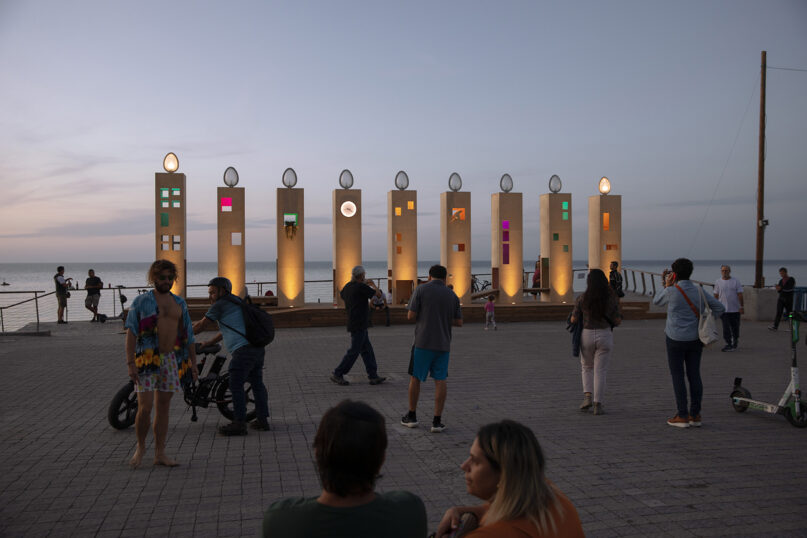(RNS) — Let’s call it Facebook Theology.
Over the past year, I have noticed an interesting trend on social media. A religious holiday comes, and people will post appropriate photographs and graphics, and offer the following greeting: “Happy (name of holiday) to those who celebrate.”
On the one hand, I find that greeting to be odd. To whom else would you be wishing a happy, say, Hanukkah, or even a “Shabbat shalom,” other than to those who celebrate it?
But, on the other hand, something is going on here, and it speaks to how Americans now understand religion.
In my woefully unscientific observation, based on my Facebook feed, the “to those who celebrate” wishers are overwhelmingly Jewish.
They are most likely responding to something that’s been simmering in American religious culture for a long time. It is the default setting of American religiosity, the ubiquity of a Christian religious culture.
Jews and other non-Christians constantly encounter “Merry Christmas!” and experience seasonal Santa Claustrophobia. It is inescapable and it seems to be starting earlier and earlier with every passing year.
Ah, religious conservatives will say, there you go! This is the “war on Christmas!”
Sorry, Virginia: there is no war on Christmas. This is a different kind of war.
It is not a “war on …” It is a “battle for …”
It is a battle for American religious pluralism.
Many non-Christians are tired of being thrown theological bones during this season — of being less than and Other. Many of them hear “Merry Christmas!” as, at the very least, presumptuous, and at the very most, hegemonic.
They do not want to echo the chutzpah of “Merry Christmas!” So, they make their offerings of, say, “Happy Hanukkah!” gingerly.
I get it — even though I now accept warm wishes of “Merry Christmas!” in the way it was intended — as an act of generosity and graciousness.
The sales associate at Target is hardly my idea of a religious zealot, ready to carry the cross into battle as soon as her shift is over.
Ours is a brutal and coarse culture. Why not accept a good wish, even if it is not the way we would have wanted it phrased?
Yes, we recoil from the loudness of “Merry Christmas!” and the “in your face” nature of public Christian observance.
Being who you are too loudly is, at the very least, a nuisance and perhaps even vulgar.
But the opposite is also true.
There is something in that “to those who celebrate” that seems too cautious and too timid.
This is the industrial byproduct of secularization. It is the public softness of the religious claim.
Here, my teacher is the late sociologist of religion John Murray Cuddihy. Western civilization, he wrote, rests on secularized Christianity, and in order to be fully accepted in it, the classical Jew was obliged to euphemize himself.
He had to be “nice,” to renounce the “intensity, fanaticism, and inwardness,” the “too muchness,” of his personality and his history. The “ordeal of civility” was the price of admission to the heaven on earth of American social status.
But, not only Jews. In his book “No Offense: Civil Religion and Protestant Taste,” written in 1978, he brings us a compelling observation.
From the inside, one feels: “I am a Catholic,” “I am a Jew”; but in a differentiating society, this global, even “oceanic” identity-feeling is broken up; it must not intrude itself embarrassingly, irrelevantly, into secular social occasions. This inner experience of secularization expresses itself in ordinary life in the everyday phrase “I happen to be … “a Catholic,” “a Protestant”, “a Jew” …Religion must know its proper place in a modernizing society. Religious identities must not be pushy, elbowing themselves into contexts where they do not belong.
I believe Cuddihy got this right. There is a certain secularist pushback that forces us to minimize our religious identities, precisely for fear of being thought “evangelical,” “fundamentalist” or (gulp) “too Jewish.”
Herein lies the paradox. It turns out when you do religious stuff publicly, it has meaning.
I had a small taste of this on this past Sunday. One of our Temple Israel religious school students decided he would organize a public Hanukkah observance in his (not overwhelmingly Jewish) neighborhood in West Palm Beach, Florida. He arranged for a hanukiyah to be there. He wrote and delivered an erudite and appropriate introduction to the holiday. There were local town officials there. Most of the people were not Jewish, but all of them thanked him for making this happen.
At its core, Hanukkah is about pirsum ha-nes, a PR campaign around overlapping and intertwining miracles — yes, a legend about a small amount of oil in the ancient Temple that lasts eight nights, but also, and more powerfully, a Judean military victory against the most powerful army in the world and a religious miracle — the creative survival and thriving of Judaism itself.
Oh, one other thing.
If the Maccabees had lost to the Syrian-Greeks, there would have been no more Torah.
No more Judaism. No more Jewish people that would have carried the flag of monotheism. No Jewish people that would have ultimately birthed Jesus of Nazareth. No Jewish Bible that would wind up as the “Old Testament.” No monotheism, and no Jewish scriptures, that would ultimately influence Islam.
So, yes: A happy Hanukkah — to those who celebrate.
Perhaps we all should.






